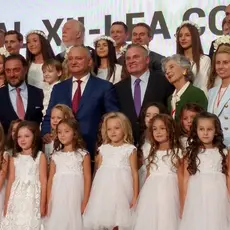The Associated Press reports that the theme of the next World Congress of Families, which will be held in Salt Lake City next year, is “religious liberty.”
“Religious liberty” is the hot topic for the Religious Right these days, but it doesn’t mean the same thing to the World Congress of Families and its allies that it means to the rest of us.
WCF has defended oppressive laws throughout the world, including a pair of recent Russian laws that were so extreme that they were condemned by even U.S. Commission on International Religious Freedom chairman Robert George — a prominent opponent of marriage equality in the U.S. — as "part of the Putin government’s assault on freedom of religion and expression."
The group applauded Putin’s crackdown on LGBT people, saying, “The Russians might be the Christian saviors of the world” and helped to bring in American validators like the National Organization for Marriage’s Brian Brown to encourage a spate of anti-gay laws. WCF and its allied activists in Russia promoted and defended the most notorious of these laws, a gag order on pro-gay-rights speech — or “propaganda” — to minors, and worked with the law’s author to plan the Kremlin conference.
WCF, nonetheless, had to cancel its conference at the Kremlin this year — which was to be funded by major Vladimir Putin allies — after participants started to back out fearing a foreign policy headache.
WCF board member Janice Shaw Crouse, who is also a senior fellow at Concerned Women for America, has defended Putin’s prosecution of the members of the band Pussy Riot, which led to the passage of a ban on religious blasphemy.
Earlier this year, WCF presented an award to its Africa regional director, who backed a ban on free association among gay people in Nigeria.
The Salt Lake City conference’s website says the event will be organized by the Sutherland Institute, a Utah-based group whose president, Paul Mero, used to be an executive at the Howard Center for Family, Religion and Society, which runs the World Congress of Families. Mero was the coauthor of WCF founder Allan Carlson’s book, “The Natural Family: A Manifesto.”
Last year, after the Supreme Court heard arguments in two marriage equality cases, Mero presented his view that freedom is incompatable with gay rights. Society cannot truly be free, he wrote, if our laws “codify bad behavior” like homosexuality, because “bad behavior is the enemy of freedom.”
However these two cases are ultimately decided, I have to wonder aloud if the average American today even understands the requirements of a free society. I’ll remind you of what I have stated repeatedly: A free society requires us to become our better selves. In other words, a free society cannot long endure an aggregate of bad behavior. If the people decide one day that stealing is actually fine, we would eventually lose our freedom. If the people decide one day that lying is okay, we would eventually lose our freedom. Or, if the people decide one day that infidelity in our most personal relationships is normal, we would eventually lose our freedom.
Bad behavior is the enemy of freedom. Yes, a free society is very patient and very forgiving. Individually, each of us has great liberties to work out our lives for the better. We stumble and we fail, but as long as we keep trying to better ourselves, in character and virtue, freedom remains undisturbed. It’s only when we give up on becoming our better selves, only when a majority of people argue that character and virtue don’t matter, only when a nation decides to redefine the best within us to mean anything we need it to mean in justifying bad behavior that our freedom is in jeopardy.
…
There’s a lot we could talk about there but the idea itself raises another question regarding “gay rights”: How does homosexuality help us to become our better selves? What benefit to society is derived from two men being able to marry?
Again, a free society is very tolerant by nature. Everyone has wide latitude in working out their personal lives – and every one of us behaves badly to one degree or another. That’s a given. It’s part of life. But what a free society can ill afford is when the people decide to codify bad behavior in the law. Our laws increasingly reflect our dysfunctional selves, not our better selves. The argument over “gay rights” and same-sex marriage is ultimately an argument over whether or not we enshrine bad behavior in our laws. Being “gay” might be about personal feelings and sexual attractions for some. But our laws only know human behavior – and a free society requires that our laws sustain and encourage the best within us, not our selfish worst.





